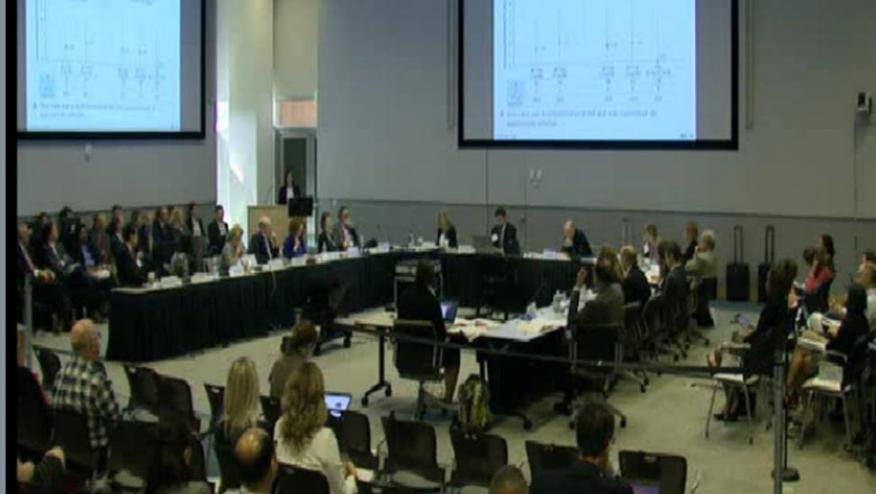FDA AAC Splits Vote in Favor of Nintedanib for Scleroderma Interstitial Lung Disease Save

Today, July 25th, the FDA convened Arthritis Advisory Committee to consider the new drug application for nintedanib (trade name OFEV), sponsored by Boehringer Ingelheim (BI), for the treatment of systemic sclerosis-associated interstitial lung disease (SSc-ILD).
The panel was asked to consider the efficacy and safety of nintedanib interstitial lung disease (SSc-ILD) and to consider the different subgroup analyses after a review of the clinical trials, especially the SENSCIS trial, recently published in the NEJM.
The Voting
The FDA posed the following voting questions to the advisory panel:
- “Is the safety profile of nintedanib adequate to support approval of nintedanib for the treatment of systemic sclerosis interstitial lung disease?
- "Is the safety profile of nintedanib adequate to support approval of nintedanib for the treatment of systemic sclerosis interstitial lung disease?"
- “Do you recommend approval of nintedanib at the proposed dose of 150 mg twice daily for the treatment of systemic sclerosis interstitial lung disease?
After a day of presentations by FDA reviewers and the sponsor (BI), and review of the data, the committee members voted on 3 questions. The vote on question #1 (do you approve nintedanib based on efficacy) was:
- Yes 10
- No 7
The vote on question #2 (do you approve nintedanib, based on the safey):
- Yes 14
- No 2
- Abstain 1
The vote on question #3 (do you approve the proposed dose of 150 mg twice daily):
- Yes 10
- No 7
Many of the votes against nintedanib noted the low magnitude of benefit, moreso than safety concerns. Many voting in favor of nintedanib were swayed by significant results on FVC changes in a disorder (SSc) that has no approved indications and for which there is a large unmet need.
The panel’s recommendation and discussion are advisory to the FDA, who will issue a final decision on nintedanib application at a later date.
The Panel Members
The AAC panel included 17 voting members that included rheumatologists, pulmonologists and epidemiologists/statisticians, Consumer representatives and a non-voting industry representative.
The Discussion
SSc-ILD is a rare and serious disease for which there are no FDA approved therapies and an unacceptably high percentage of SSc patients are at risk for SSc-ILD and its attendant hazards, including death.
Nintedanib is a small molecule, tyrosine kinase inhibitor that is currently FDA approved for the treatment of idiopathic pulmonary fibrosis (IPF). It is being studied in SSc given its anti-fibrotic and anti-inflammatory effects in preclinical models of systemic sclerosis and ILD.
For the proposed SSc-ILD indication, the proposed dosing regimen is 150 mg twice daily, the same as the dosing for the currently approved indication for the treatment of idiopathic pulmonary fibrosis (IPF).
While the results of the IPF and the INPULSIS trials were shown, the primary focus was on the SENSCIS Trial, published in the NEJM in Nintedanib in June 2019.
Among 576 SSC patients, 52% had diffuse cutaneous disease and 48% had limited SSc and nearly half were on background mycophenolate and prednisone.
The primary endpoint outcome was the adjusted annual rate of change in FVC change over 52 weeks. Secondary outcomes included changes in the modified Rodnan Skin Score (mRSS) and the St. Georges outcome (SGRQ; used in COPD trials).
The results favored the nintedanib group with an FVC change of −52.4 ml per year compared to the placebo group (−93.3 ml per year) (difference, 41.0 ml per year; 95% confidence interval [CI], 2.9 to 79.0; P=0.04). Nintedanib treatment also was associated with 46 percent relative reduction and absolute change from base line and FVC compared to placebo at 52 weeks.
The other secondary outcomes were not significant including the modified Rodnan skin score and the SGRQ at week 52.
The efficacy data showed that overall, patients on placebo were more likely to worsen, while patients treated with nintedanib were more likely to improve. Thus treatment with nintedanib is associated with meaningful slowing of lung disease progression.
Interestingly, both the sponsor and FDA noted a nonsignificant difference, but nonetheless, trend towards a lower response in the USA/Canada compared to patients from Europe and Asia. It was clearly shown that there was significantly more background MMF use in the USA/Canada, but sub analyses according to MMF failed to show a significant difference between MMF users and non-users. The sponsor interpreted this by suggesting the benefit of nintedanib is independent of MMF use.
The safety outcomes were roughly the same between groups, but diarrhea was much more common in those receiving nintedanib (75.7% nintedanib vs 31.6% placebo).
There were more hepatic adverse events (AE) seen in with nintedanib (17% vs 5%), but there were no cases of hepatic failure, death or patients meeting Hy’s law criteria. Hepatic AE were primarily mild transient liver enzyme elevations.
Bleeding events were infrequent, mild and not serious and occurred with the same frequency in both nintedanib and placebo groups. MACE (major adverse cardiac events) were infrequent (<2%) in both groups.
Overall there were 19 deaths (9 nintedanib; 10 PBO). Serious adverse events were equally balanced between groups - 62 vs. 60 (23% overall), but there were more “severe” AE with nintedanib primarily due to diarrhea.
The product label for the approved drug, OFEV (nintedanib) lists adverse events warnings and precautions from the IPF trials and includes elevated liver enzymes; drug induced liver injury, diarrhea, nausea, vomiting, bleeding events and gastrointestinal perforation.
Thus, these data show that nintedanib significantly reduced the annual rate of decline in FVC by 44% relative to placebo but had no effect on other SSc outcomes, including skin (mRSS).










If you are a health practitioner, you may Login/Register to comment.
Due to the nature of these comment forums, only health practitioners are allowed to comment at this time.